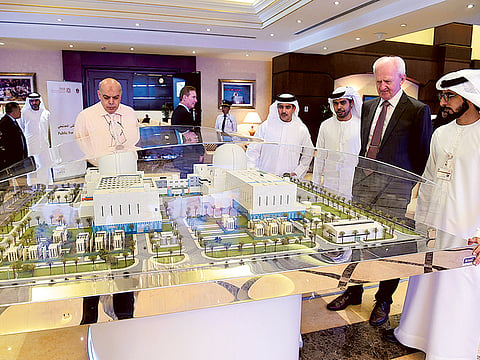Fukushima-type disaster unlikely in UAE, experts say
Federal authority holds open public forum to discuss safe use of nuclear power

Abu Dhabi: A major disaster such as the one at the Fukushima nuclear power plant in Japan is unlikely to happen in the UAE largely due to the country’s geographical location as well as stringent safety measures in place, experts said during an open public forum held in the capital on Tuesday.
Organised by the Federal Authority for Nuclear Regulation (FANR), the public event which took place at the Emirates Centre for Strategic Studies and Research has become an annual feature for the organisation, allowing it to engage with residents.
“At the time of the Fukushima accident we were involved in reviewing the construction licence for the Emirates Nuclear Energy Corporation (Enec). We took immediate steps soon after the accident to try and understand the causes behind the incident, and what relevant countermeasures we should take,” Christer Viktorsson, director-general of FANR, said.
“Regarding the site itself in Japan, the accident was mainly caused by a tsunami after a major earthquake. We studied the nuclear plant site in Barakah to see if a similar tsunami event could take place which would endanger the site and cause a flooding event. After a lot of assessments, including recommendations from international experts, we were confident that such severe accidents would not affect the nuclear power plants,” he added.
Haitham Al Sanaani, nuclear safety specialist at FANR, who worked on site at the Barakah nuclear power plant, said: “The water depth in the Arabian Gulf region is 36 metres, whereas in the case of Japan the tsunami area had a depth of up to 6,000 metres, as a result the water in this area cannot get very high waves as we witnessed in Japan,” he explained.
Al Sanaani added that the UAE is for the most part unaffected by large earthquakes. “We conducted studies and found that the UAE is not exposed to major earthquakes as in Japan. Earthquakes measuring six to eight on a Richter scale do not happen here. In general the UAE’s location is protected from such major natural disasters such as tsunamis and earthquakes,” he said.
On the issue of handling nuclear waste material, Viktorsson told the audience that the FANR is responsible for issuing guidelines on how operators are supposed to handle the waste.
“The government has formed a special organisation for waste management, so operators such as Enec will have to store that waste in a safe manner as laid out by FANR, and then the government organisation will develop a policy on implementing a plan on dealing with the waste,” he said.
Viktorsson explained that a number of options are currently being looked at. “One option is to reprocess the nuclear fuel and send it to another country so it can be used as fuel over there,” he said.
“Another option is to not reprocess [the waste] but to take the waste as it is when it comes from the reactor, and then store it inside a special container. Those containers will be put inside a geological repository,” he added.
Sign up for the Daily Briefing
Get the latest news and updates straight to your inbox



